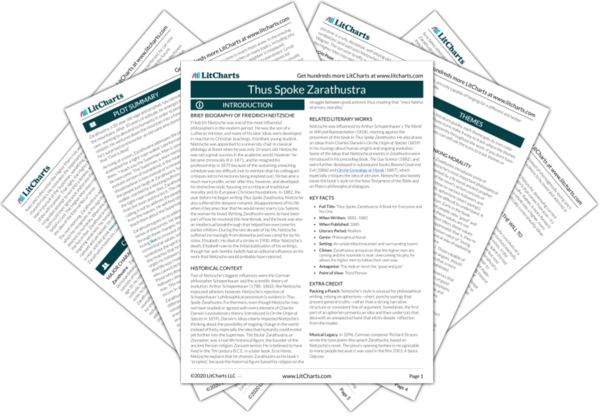Rethinking Morality
Thus Spoke Zarathustra introduces some of Friedrich Nietzsche’s most important philosophical ideas, as presented by a fictional ancient prophet named Zarathustra. Most of the novel’s action consists of Zarathustra proclaiming his ideas to various followers and opponents in the form of poetic aphorisms (short sayings), which are often esoteric and can be difficult to understand. A foundational idea is moral relativism. Early in the book, Zarathustra observes that different people view “good” and “evil”…
read analysis of Rethinking MoralityThe Superman and the Will to Power
In Thus Spoke Zarathustra, Nietzsche conceives of a race called the Superman that has evolved mentally and spiritually beyond humanity as it currently exists. In the novel, a spiritual teacher named Zarathustra has spent the last 10 years meditating in solitude in a mountain cave but now reenters society to spread his teachings. Indeed, Zarathustra himself is a kind of ancient forerunner of the Superman to come. The Superman creates new values, throwing out…
read analysis of The Superman and the Will to PowerDeath of God and Christianity
Early in the novel, Zarathustra comes upon a praying saint in the forest and is surprised to discover that someone exists who doesn’t yet know that “God is dead.” This is one of Nietzsche’s best-known statements, but it’s often misunderstood. More than an avowal of atheism, it is meant to announce the death of an old value system and an obligation to seek a new one (at least for those stronger individuals capable of it)…
read analysis of Death of God and Christianity
Eternal Recurrence
Throughout the novel, Zarathustra speculates about something called the eternal return, or recurrence. Eternal recurrence is the idea that everything in existence has been recurring for an infinite number of times across time and space and will continue to do so. (This isn’t the same thing as the concept of reincarnation, because Nietzsche posited that beings would return in the same bodies.) For Nietzsche, eternity isn’t “better” than this life—it’s the recurrence of this life…
read analysis of Eternal Recurrence






